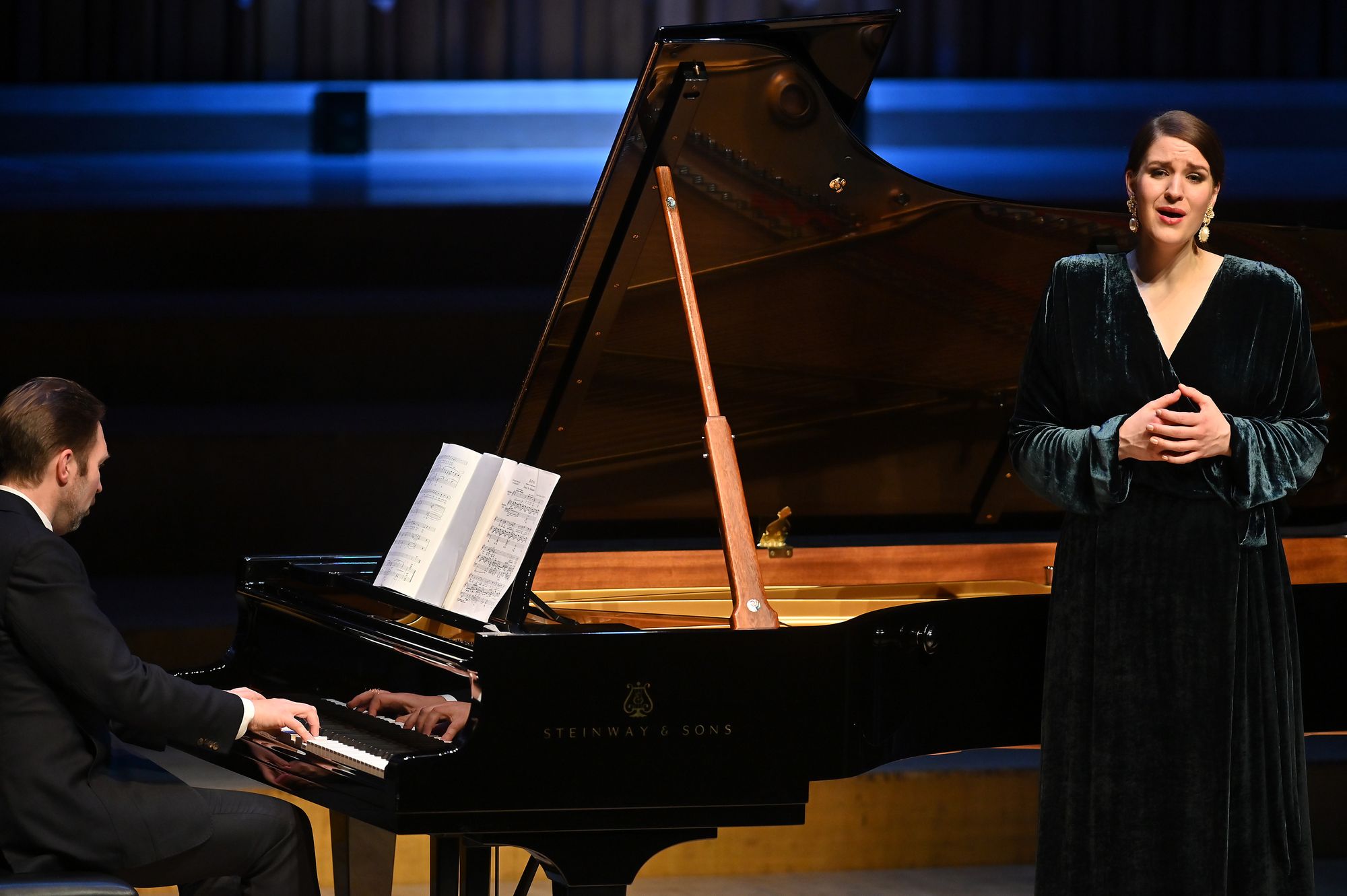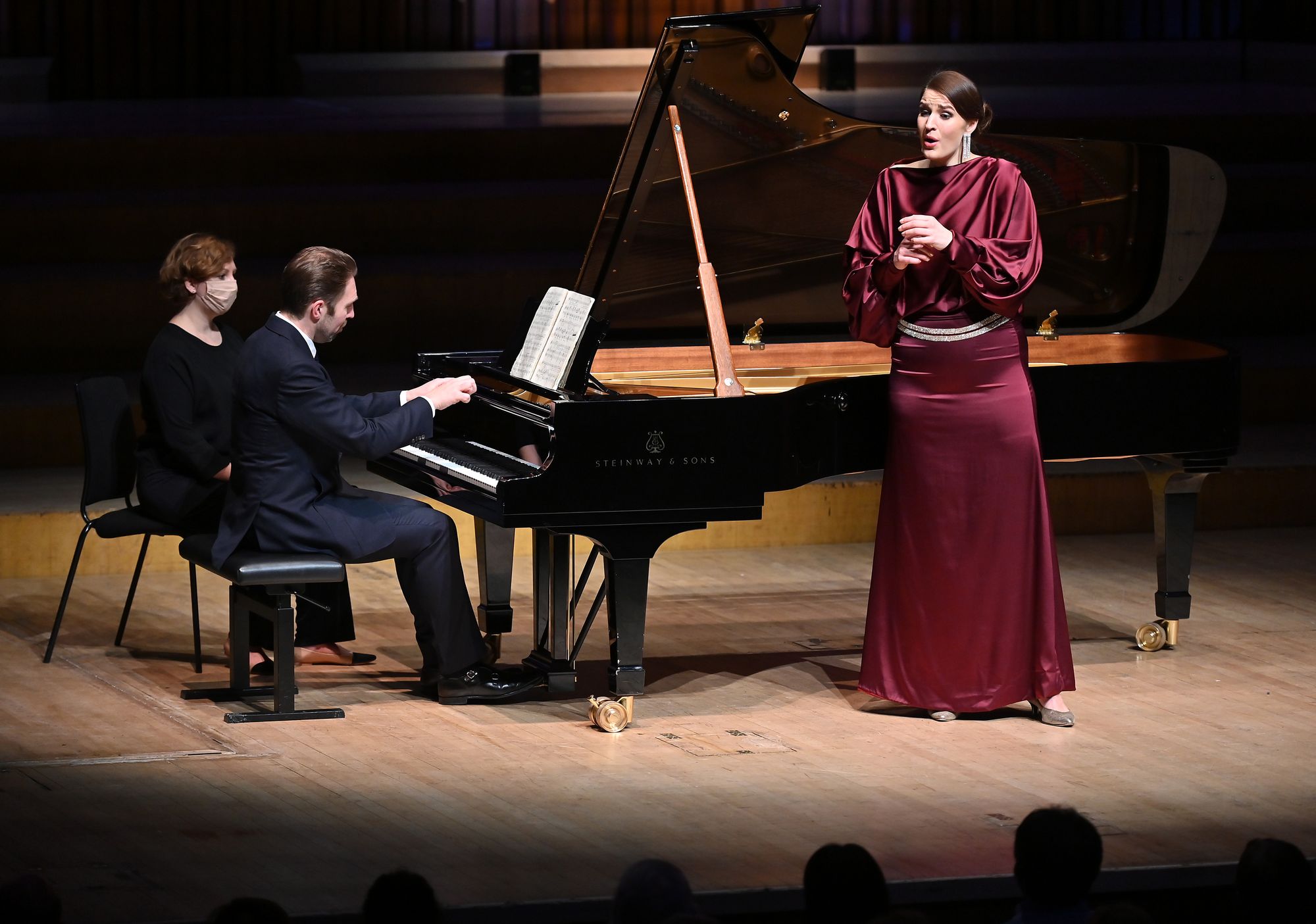Lise Davidsen & Leif One Andsnes: on tour, and on disc

Soprano Lise Davidsen and pianist Leif Ove Andsnes, surely Norway's greatest exports since Kirsten Flagstad and Edvard Grieg himself, performed the final leg of their recent tour to a packed-out Barbican Hall on Wednesday, January 13. The tour celebrated (read promoted) their new release of Grieg songs, taking the Six Songs, Op. 48 (sung in German) and Haugtussa (The Mountain Maid, sung in Norwegian) from the album, adding Jeg eslker dig, Op. 5/3 as one of two encores, and following on with a second half of Richard Strauss and Wagner. The concert also constituted the first leg of Davidsen's Barbican Artist Spotlight residency (details here).
The Barbican performace was an absolute triumph. At times the combination of fullness and freedom in Davidsen's voice reminded me of that of the great Jessye Norman (the Strauss songs chosen were core Norman territory, too: from Op. 27, "Ruhe, meine Seele," "Cäcilie" and "Morgen!," and from Op. 39, "Befreit" plus, as the first of two encores, "Zueignung"). Davidsen's voice can be huge (as certain Strauss songs reminded us) but it can also be remarkably intimate, something we heard in Wagner's Wesendomck-Lieder and the Grieg.

For the recital, Davidsen started with the Six Songs of Op. 48 by Grieg, settings of German writers such as Goethe and Heine - Grieg's first return to German poery since his earliest songs. One thing that was clear from the Barbican recital - clearer, even than on disc - was what a difference it makes to have a paster pianist at the piano stool. Andsnes' way with the opening ascending phrases was utter delight in "Gruß" (Greeting, to a poem by Heine) leads to the profundity opof "Dareinst, Gedanke mein" (One Day, O Heart of Mine; text Emanuel Geibel, 1815-84). Andsnes begins "Lauf der Welt" (Way of the World; Ludwig Uhland; 1787-1862) incredibly characterfully (again, just a touch more so live), with Davidsen tenderly delivering every phrase, her voice perfectly reined in.
Here's "Gruß" and "Lauf der Went"in the Decca recording:
... and for an example of tenderness (against the Romantic poetic archetype of the nightingale), here's "Die verschwiegene Nachtigall" (The Nightingale's Secret); just listen to how Davidsen caresses the punctuating, nonsense word, "Tandaradei!":

Grieg's song-cycle Haugtussa, Op. 67 (The Mountain Maid) is his only offering in this form. Setting an 1895 verse-novel by Arne Garborg, and Grieg sets poems that represent a similar Romantic direction to Müllerin: a boy/girl romance that encpmasses ecstatic highs followed by the pain of parting. Here, the girl is called Veslemøy. It;'s also impossible to miss parallels between Grieg's final song, "Ved Gjaetle-Bekken" (At the Brook) and the final song of Schubert's Müllerin, "Des Baches Wiegenlied":
Davidsen's Barbican performance of Haugtussa was a major event, unforgettably imprinting the musico-historical importance of this cycle on everyone present. Was there one person there at the Barbican who didn't question why the cycle isn't core repertoire?
I can pay Davidsen no higher compliment than to compare her performance of Haugtussa to that of her compatriot Kerstin Flagstad. Here's Flagstad with the complete cycle in 1957 with pianist Edwin MacArthur (some readers may perhaps remember this from a Decca Eclipse reissue LP, a copy of which is available on Amazon - link provided below):
Here's Davdisen on Decca in the third song, "Blåber-li" (Blueberry Slope):
Both singers capture the delight in Nature expressed by the protagonist - both are born story-tellers. Perhaps I find that bit more delight in Andsnes' contribution as opposed to McArthur's, though...
Before we consider the rest of the disc, let's have a quick look at the second half:
The disc is there to put Grieg songs on the World map - something it will surely succeed in - while the concert additionally revealed how Grieg sits easily in the exalted company of the "two Richards": Strauss and Wagner. It also gives us an excuse to sample Davidsen's recorded versions with orchestra (Philharmonia / Salonen, also on Decca). Whereas Salonen offers a whopping great cushion of sound against which Davidsen can weave the vocal line ("Nicht ein Lüftchen, Regt sich leise"; Not even a soft breeze stirs), Andsnes' sparer, yet somehow more powerful, way, was even more telling, his opening chords as deep a sound as a concert grand can make.
Davidsen sang three out of strauss' Op. 27 set. "Cäcilie," the second, is an impulsive, animated song. Again, here's Davidsen's superb version with orchestra:
Strauss' song "Morgen!" (Tomorrow) has reduced many to tears - I suspect it was so in the Barbican. It's a song of sweet regre, and hopet:
It's worthwhile mentioning that the second half brought us to core Jessye Norman territory - if because occasionally in the second half of the concert, Davidsen's excellence - and her voice, even - brought that great lady to mind:
Nice to hear "Befreit," Op. 39/4, a held-breath song in the way only Richard Strauss knows how. Interestingly, Andsnes seems to seek to bring out the more Wagnerian harmonies in this song, apt as it was Wagner's Wesendonck-Lieder up next in performances of radiant glory. No wonder the recrption was so enthusiastic.
So, back to teh Decca Grieg disc In addition. to Op. 48, Davidsen and Andsnes offer another full set, that of the Songs, Op. 69, a set of five composed in 1900 and sung in Norwegian. How atmospheric is Andsnes in the first, "Der gynger en Båd på Bølge" (A Boat on the Waves is Rocking) and how Davidsen creates a wonderfully impassioned climax:
Although not a song-cycle per se, Op. 69 traverses a huge emotional range. Here's the third song, "Ved Møders Grav" (At Mother's Grave, a Lento funebre in C minor):
... complemented by the delicious, inviting textures of "Snegl, Snegl!" (Snail, snail):
Davidsen and Andsnes pepper the Decca disc with carefully-selected songs that underline Grieg's genius. It would perhaps be to easy to end with the most famous of Grieg's songs, "Jeg elsker dig". Instead, let's lose with an extravagant song that comes closest to Richard Straussian expression: "Poesien," Op. 18/5, in a performance that demonstrates exactly why Davidsen and Andsnes are a match made in Heaven:
